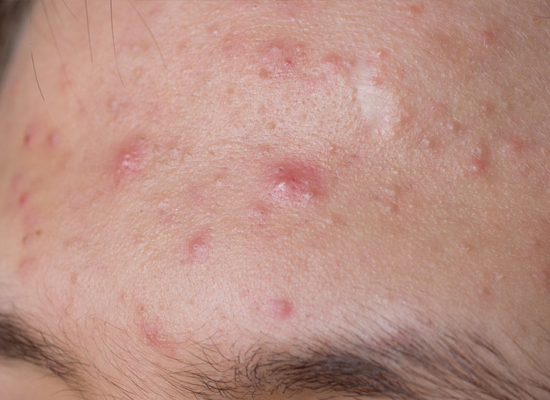Acne is one of the most common skin conditions we treat at Dermatology Healthcare Excellence. Whether you’re struggling with blackheads, whiteheads, painful cystic acne, or stubborn breakouts that just won’t go away, we understand how frustrating and emotional it can be. Fortunately, effective acne treatment is possible, and we’re here to help.
At DHE, our board-certified dermatologist specializes in creating customized treatment plans to help patients of all ages get clearer, healthier skin. Acne affects people differently, but with the right diagnosis and care, we can significantly improve your skin’s appearance and your confidence.
If you’re looking for acne dermatology services near you in the Denver and Lakewood, Colorado area, or searching for an expert in acne treatment for teens, adults, or hormonal acne, we welcome you to schedule a consultation.
What Is Acne?
Acne is a skin disorder that develops when hair follicles become clogged with oil (sebum), dead skin cells, and sometimes bacteria. This can lead to inflammation, redness, bumps, and blemishes that vary in severity. While it’s often associated with teenagers, acne can affect adults well into their 30s, 40s, and even 50s.
Common Causes of Acne
- Hormones: Hormonal changes during puberty, menstruation, pregnancy, or due to conditions like polycystic ovarian syndrome (PCOS) can trigger excess oil production and lead to acne.
- Genetics: If your parents struggled with acne, you’re more likely to experience acne as well.
- Bacteria: The presence of certain bacteria (Cutibacterium acnes, formerly Propionibacterium acnes) on the skin can worsen inflammation and breakouts.
- Diet and Lifestyle: Foods high in sugar or dairy, lack of sleep, and stress can contribute to acne flare-ups.
- Skincare Products: Using pore-clogging or irritating products may lead to breakouts.
Types of Acne Lesions
Understanding what kind of acne lesions (“bumps” or ”spots”) you have helps us determine the most effective treatment approach. Acne can range from mild to severe and may involve many different types of blemishes at once.
The most common types of acne lesions include:
- Whiteheads: Also known as closed comedones, these form beneath the skin’s surface when pores become clogged with oil and dead skin cells. They appear as small, flesh-colored bumps with a visible white head.
- Blackheads: Also called open comedones, blackheads are pores clogged with the same materials as whiteheads, but the surface remains open, and the exposure to air causes oxidation, which turns the plug black.
- Papules: These are small, red, tender bumps without a visible whitehead. They form when the walls around the pore break down due to inflammation.
- Pustules: These are similar to papules but are filled with pus. They appear red at the base with a white or yellow center.
- Nodules: Nodules are large, hard, painful lumps beneath the surface of the skin. They don’t have a visible head and can take weeks to heal.
- Cysts: Cysts are large, pus-filled sacks deep under the skin and often result in scarring if left untreated.

How We Treat Acne
Every patient’s skin is different, which is why there’s no one-size-fits-all approach to acne treatment. At DHE, we offer comprehensive acne care tailored to your skin’s unique needs.
Your acne treatment plan may include:
Lifestyle guidance: Acne can be affected by diet, sleep, stress, and environmental factors. We’ll help you identify triggers and adjust habits to support healthy skin without compromising overall health.
Topical treatments: Prescription-strength retinoids, benzoyl peroxide, azeleic acid (dicarboxylic acid), AHA (alpha hydroxy acid) like glycolic or lactic acid, or topical antibiotics that help reduce inflammation, kill bacteria, and prevent future breakouts.
Oral medications:
- Antibiotics to fight bacteria and calm inflammation.
- Hormonal therapy, such as birth control pills or spironolactone, to regulate hormonal acne.
- Isotretinoin (Accutane) for severe or cystic acne when other treatments haven’t worked.
In-office procedures:
- Chemical peels to exfoliate the skin and unclog pores.
- Light and laser therapy to reduce bacteria and oil production.
- Cortisone injections for large, painful cysts.
- Microneedling to improve acne scars over time.
Medical-grade skincare: Our dermatologists can recommend acne-friendly cleansers, moisturizers, and sunscreens that won’t clog pores (“non-comedogenic”) or irritate your skin.
What to Expect from Acne Treatment
It’s important to know that acne treatment takes time and consistency. You may notice your skin gets worse before it gets better, especially in the early stages of using new products. This is a normal part of the healing process.
Here’s what to keep in mind:
- Results take time: It can take 6–12 weeks to see significant improvement, while some medications can take 6 months to be fully effective.
- Initial purging: New medications may bring underlying breakouts to the surface.
- Stick with your regimen: Skipping treatments or overusing products can delay progress.
- Follow-up is key: Regular check-ins allow us to adjust your plan as your skin changes.
Clear skin is a journey, but you don’t have to do it alone. Our team is here to guide and support you every step of the way.
Tips For Managing Acne At Home
In addition to professional treatment, good skincare habits play a big role in preventing future breakouts and minimizing irritation.
Here are some skin-friendly acne tips:
- Be gentle: Avoid scrubbing or using harsh exfoliants. Use a mild, oil-free cleanser daily.
- Don’t pick: Popping pimples can lead to scarring and slow healing.
- Use non-comedogenic products: Look for makeup and skincare labeled “oil-free” or “won’t clog pores.”
- Stay hydrated: Drinking plenty of water helps keep your skin balanced.
- Wash pillowcases and phones regularly: These surfaces can harbor bacteria that aggravate acne.
- Protect your skin from the sun: Always wear sunscreen, even if you have oily skin! There are great options for acne-prone skin, like EltaMD UV Clear.
If you’re unsure what products are safe for your skin type, we’re happy to provide personalized recommendations during your visit.
Acne Myths – Busted!
There’s a lot of misinformation about acne floating around. Let’s clear up a few things:
- Myth: Acne is caused by poor hygiene.
Fact: Acne is not caused by being dirty. In fact, over-washing can make it worse. - Myth: Only teens get acne.
Fact: Adult acne is incredibly common, especially among women. - Myth: Tanning clears acne.
Fact: UV exposure can worsen acne and damage your skin long-term. - Myth: You just have to live with acne.
Fact: Effective treatments exist, and we can help you find the right one.
Acne Scars and Skin Discoloration
Even after breakouts heal, acne can leave behind marks that impact your skin’s appearance. We offer several treatment options for post-acne concerns:
- Chemical peels to resurface skin and fade dark spots
- Acne facials to keep skin clear and help with mild breakouts during medical treatment
- Topical brightening agents for mild discoloration
Let’s work together to restore smooth, even-toned skin that you feel confident in.
When to See a Dermatologist for Acne
If you’ve tried over-the-counter products with little to no success, or your acne is affecting your confidence, mood, or causing scarring, it’s time to see a dermatologist.
We can help if:
- Your breakouts are painful, deep, or recurring
- You’re experiencing acne well into adulthood
- You’ve tried multiple treatments without success
- You’re noticing scarring or pigmentation issues
You don’t have to live with acne or guess your way through drugstore products. At DHE, we specialize in personalized, effective acne treatments that deliver real results. Whether you’re a teen navigating hormonal changes or an adult dealing with persistent breakouts, we’ll help you take control of your skin.
